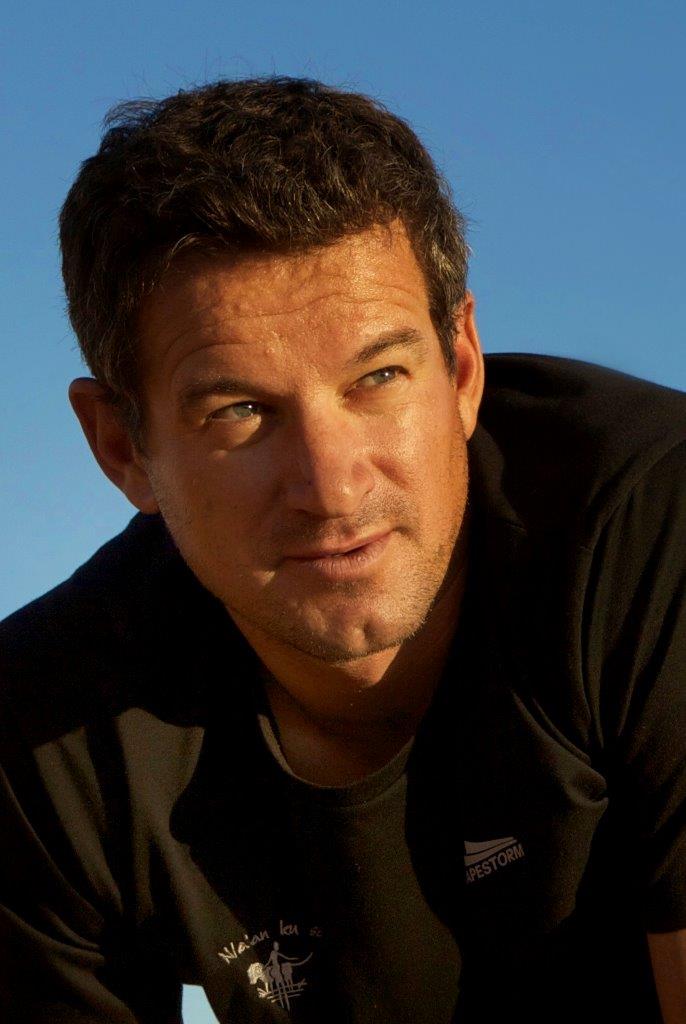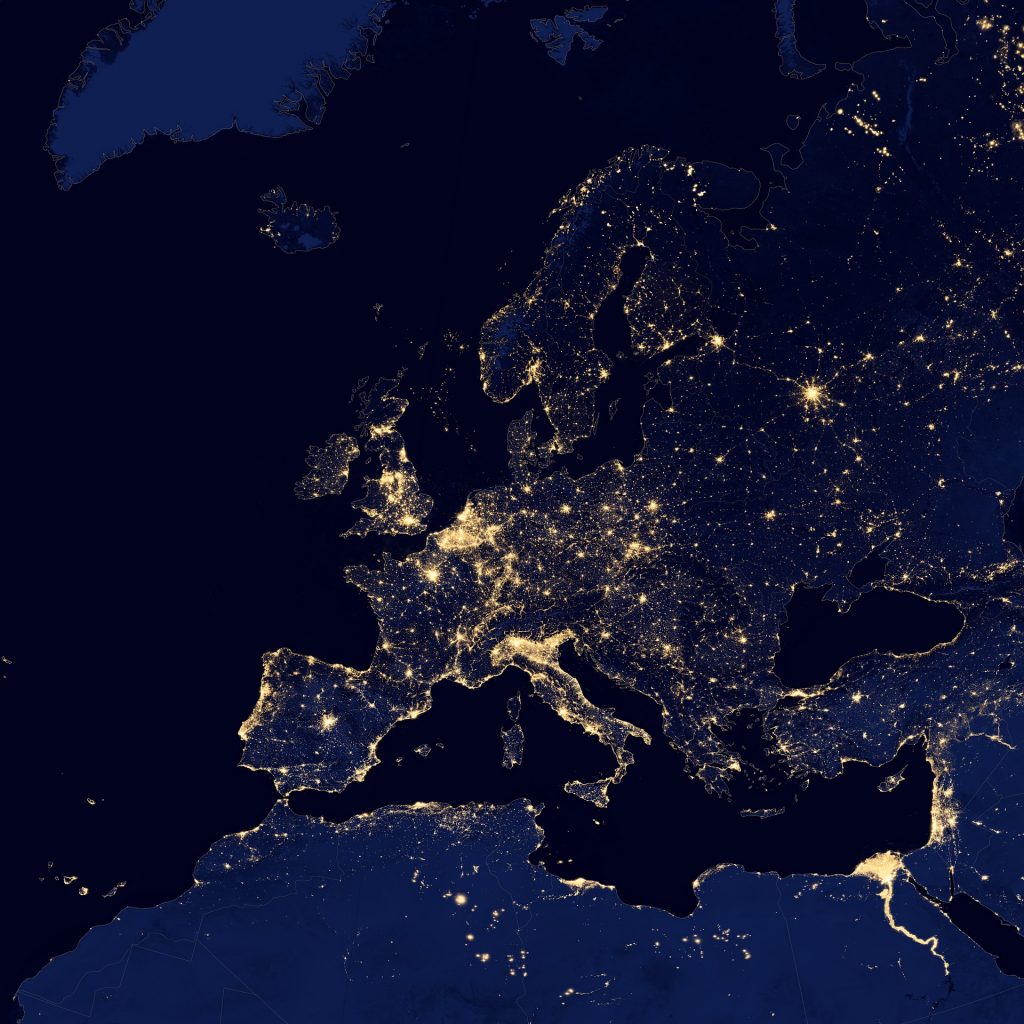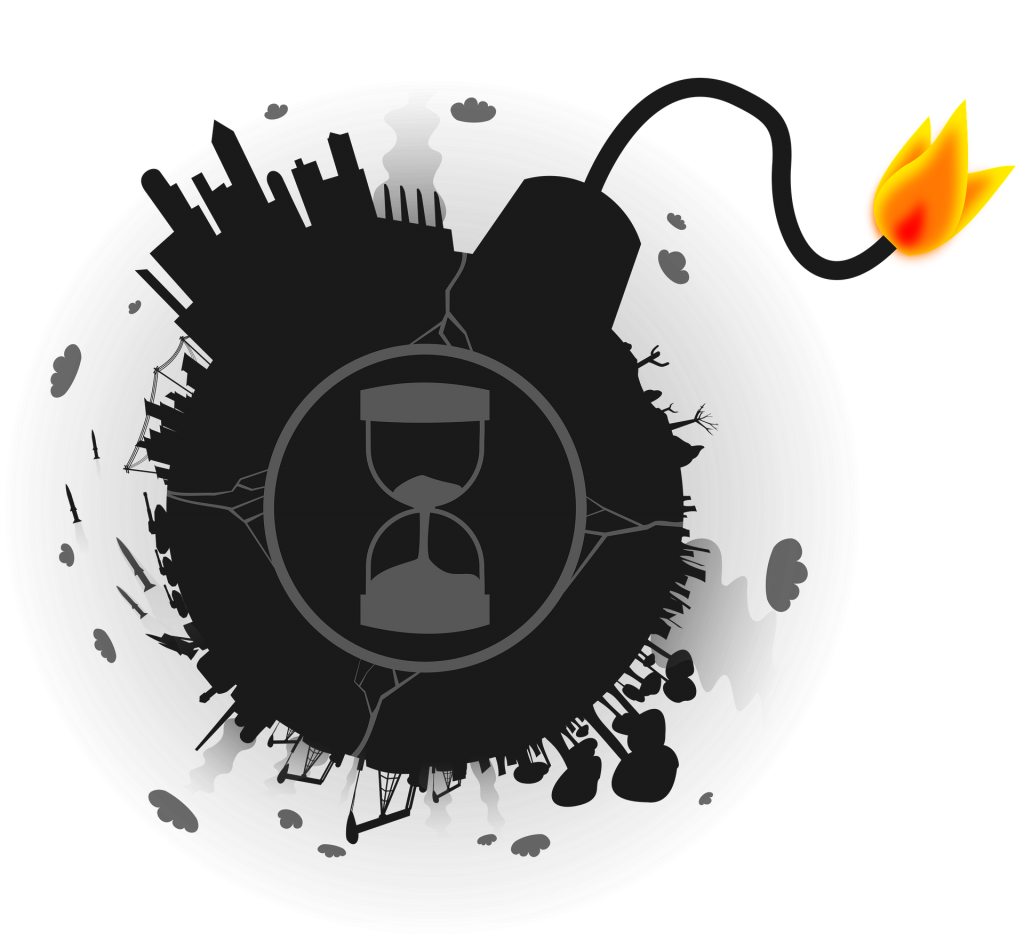In part two of our interview, Dr. Rudie and Marlice van Vuuren talk about the Naankuse Lifeline Clinic and Primary School, their film & TV work, the impact of the Covid crisis on ecotourism and their future plans.
You can read part one HERE
RsL: Besides the Naankuse Wildlife Sanctuary you also established the Naankuse Lifeline Clinic and the Naankuse Primary School. Can you tell us a little bit about these projects?
Rudie and Marlice: Well, we did mention quite a lot about the N/a’an ku sê Lifeline Clinic in answer to your first question. The clinic itself is based in the east of Namibia in Epukiro, Omaheke Region. This area is home to a large number of San communities, most of the San living in poverty. It is important to note that the Lifeline Clinic continues to grow in its many humanitarian projects. In January 2022, a chapel will be built on the clinic grounds, and on weekdays this chapel will also function as a school.
We have also established an agricultural project at the Lifeline Clinic. This project will aid self-sustainability by providing a variety of fruits and vegetables. We also deem it vital that community members be encouraged and supported through the teaching of practical vocational skills. We plan to start with vocational skills training in the future. Our “Housing and Clean-Up Project” at the Lifeline Clinic is proving immensely successful. For every 10 bags of rubbish picked up by community members, a roofing sheet for a house is provided to the person concerned. Once enough roofing sheets for a house have been earned by the community member, the Lifeline Clinic builds a house. This project is aiding the environment and bringing a steady end to the issue of so many San not having access to shelter. All in all, the Lifeline Clinic not only provides free healthcare. The clinic exists in support of a people who have been marginalized for far too long. Healthcare aside, the San deserve that which most other Namibians have access to – education, training and a future in which they can readily cope.
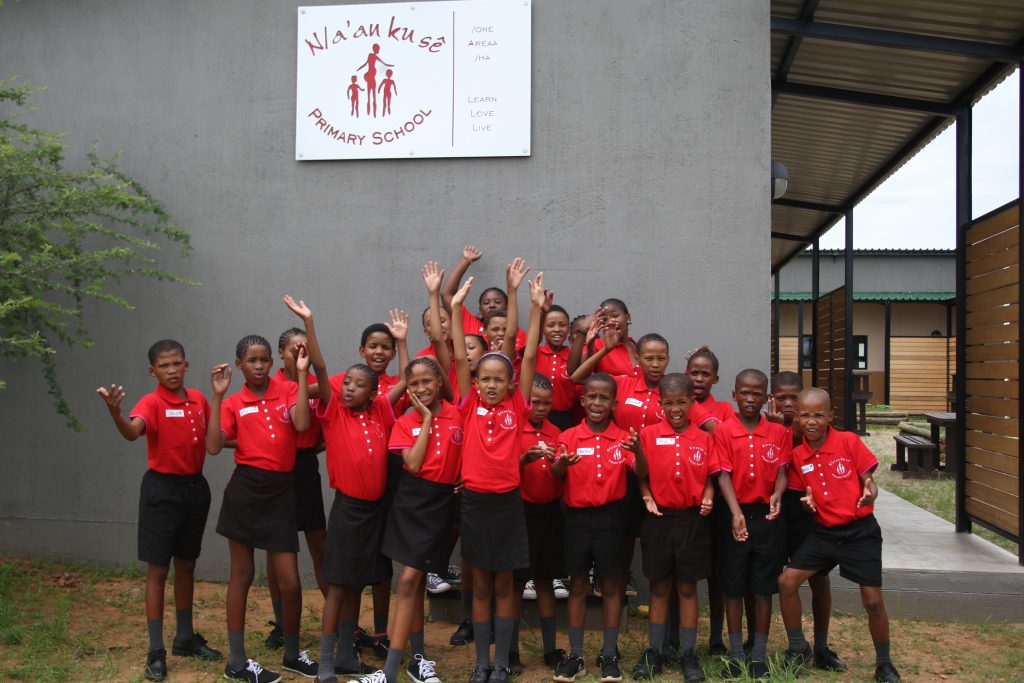
With an ever-increasing workforce at N/a’an ku sê, the need to provide education to the many children of our valued staff members became evident. This led to the N/a’an ku sê Primary School, previously called the Clever Cubs School, being established in 2009. Furthermore, San children too often face bullying when attending mainstream schools, and at N/a’an ku sê Primary School we are able to ensure that San pupils are not ostracized or unfairly treated by their peers. The school accommodates Grades 0 to 7, and not only places emphasis on academic subjects. Being located at the heart of a wildlife sanctuary provides the opportunity to teach the children about animals, nature and conservation as a whole. After graduating from Grade 7, the children attend mainstream schools, this fully funded by the N/a’an ku sê Foundation through our “Sponsor A Child” initiative and the support of donors and partners. We believe that every child has the right to education, and the N/a’an ku sê Primary School enables us to provide just that – a free-of-charge educational foundation.
RsL: What were your biggest setbacks you have experienced with regards to either the Wildlife Sanctuary or the Clinic or the Primary School?
Rudie and Marlice: Covid has been very challenging for us it had a negative impact on the school the sanctuary and the clinic. The long periods of draught and global warming also have massive impacts on our work.
Corruption in Namibia is a big concern, and if you are not willing to be part of corruption you often encounter resistance to do the work you want to do.
RsL: You are also producing a local television series “Groen: Namibie” and you support other film productions via your own company – Naankuse Films. What made you decide to start the company?
Rudie and Marlice: Filming is a vital source of funding for the N/a’an ku sê Foundation’s many conservation and humanitarian projects. Renowned international production companies film with us, relying on our expertise with those animals within our care. Our ambassador animals – those animals unable to be released back into the wild, mainly due to their habituation to humans – now act as ambassadors for their wild counterparts.
Cheetahs, caracals, painted dogs, leopards, lions and chacma baboons are just a few that have been used in a range of natural history documentaries, not only earning funds for the foundation, but also educating a global viewing audience into the magnificence and significance of these animals.
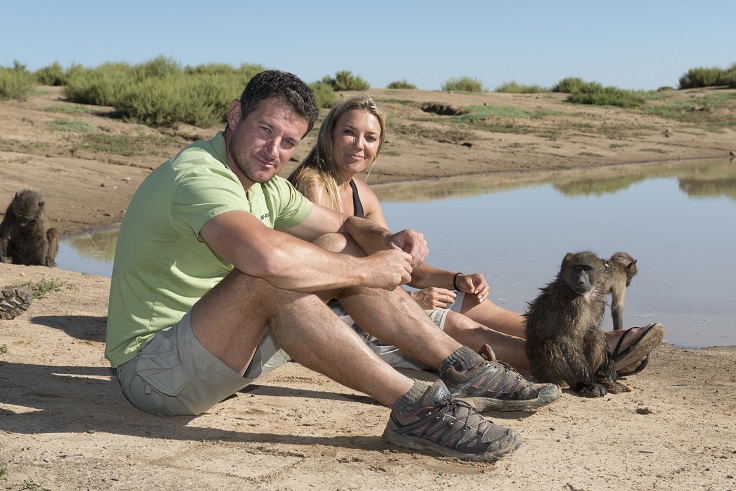
Some of our filming partners have included SKY, ITV, CNN, BBC, Animal Planet and National Geographic. Having the foundation itself and the animals of N/a’an ku sê appear on the small screen at an international level, provides unpayable promotion. Filming projects also include news segments for CNN and other global news broadcasters, as well as reality-based series for a variety of networks world-wide.
Groen Namibië is a reality-style series focusing on our work and is aired on Africa’s largest satellite broadcaster, DStv. This means that our work is showcased on a host of channels, the educational value yet again being unpayable.
RsL: How do you finance all of your endeavors?
Rudie and Marlice: Through constant fundraising efforts, innovative fundraising campaigns, international film crew, our volunteer projects and our guests. Being an NGO, we do not receive any government funding. Ecotourism is that which ultimately keeps our conservation projects alive, responsible ecotourism being fundamental to our efforts. Today’s traveler is far more “educated” about the finer nuances of conservation destinations. No longer can irresponsible and ultimately cruel wildlife practices be “packaged” as an exotic experience. Correct ethos and animal welfare is crucial to the responsible traveler, this making corresponding responsible ecotourism irreplaceable.
At N/a’an ku sê we have always placed ethics ahead of frivolous wildlife “fun”, the welfare of our animals and the offering of a true conservation experience priorities that will always remain at the top. Our lodges offering this responsible, authentic conservation experience include N/a’an ku sê Lodge, Neuras Wine and Wildlife Estate, Kanaan Desert Retreat and, currently in construction phases, the lodge at TimBila Nature Reserve by N/a’an ku sê.
Namibia’s capital city of Windhoek is home to another two N/a’an ku sê establishments, Utopia Boutique Hotel and Traveller’s Inn. All of these accommodation and tourism facilities keep our conservation endeavors afloat. Of course the support of our valued conservation partners and donors is crucial too, but the element of ecotourism provides the sustainability that a charity organization cannot do without.
RsL: Additionally to your TV and film production, you also use a variety of social media channels to spread your message and increase public awareness.
Rudie and Marlice: We do what we can. In addition to our social media platforms and television appearances (both national and international), we attend as many virtual/online conferences or expos as possible. Recently we had a virtual booth at the WCN 2020 (Wildlife Conservation Network). The WCN joins global conservation organisations with a host of relevant stakeholders.
The coronavirus pandemic caused a much-needed shift in how tourism destinations, conservation organisations and the interested traveler or stakeholder connect. It has become a far more virtual experience, which allows for more “immediate” professional relationships to be made and connections nurtured. Furthermore, the cost of attending international conferences is now minimized, a stable internet connection making connecting more convenient and accessible to many more.
As previously stated, we have seen how the mindset of travelers has changed – responsible conservation travel now a priority. This trend, thankfully, has a “policing” effect on wildlife organisations. Conservation messages spread through social media must adhere to ethical wildlife practices and not put the animal in an inadvertent place of peril.
At N/a’an ku sê we do not permit any photography, for example, of a person and sanctuary animal in close proximity. This encourages the mistaken belief that essentially wild animals are nothing more than mere pets. The ongoing development of social media and the increasing global awareness of ethical animal practices is the “policing” force that was lacking in the past.
The majority of promotion of our conservation work remains online and on small screens across the world. Natural history documentaries seem to increase in popularity each year, with our filming client base continually on the increase. Requests for interviews and appearances in reality-based online or television series is also constantly on the rise.
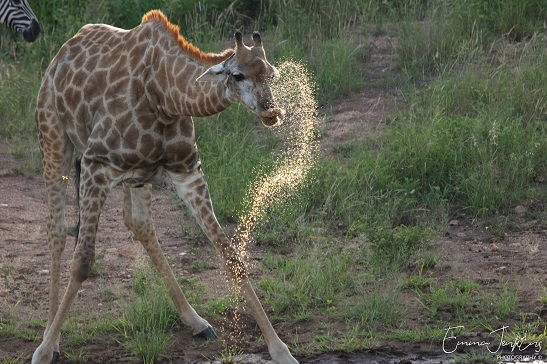
RsL: Your Foundation’s slogan is “Conservation through innovation”. What type of innovation do you mean?
Rudie & Marlice: With “innovation” we mean new and original ideas on how to raise awareness and funds for our conservation and humanitarian projects. One such innovative technique is the production of organic and hand-crafted Namibian wine at Neuras Wine and Wildlife Estate. This reserve lies south of Windhoek and is one of the world’s driest vineyards. Brandy and rum complement the range of wines, and the profits from every purchase of a Neuras product get fed back into our conservation projects.
“Innovative” also means reacting to conservation challenges as they arise and, when possible, preempting a challenge before its very existence. Our Rapid Response Unit work arose from the need to mitigate conflict between humans and wildlife, this perhaps being the main cause of global species demise. Empowering communities is another innovative conservation tool. Impoverished, suffering people are unable to worry about conservation concerns. People with the means to survive have the inclination and ability to rise to conservation challenges and make a difference.
RsL: What are the Foundation’s plans for the rest of 2021? What can we expect?
Rudie & Marlice: The 30,000-hectare TimBila Nature Reserve by Naankuse will act as a release site for animals removed from conflict. Various species are earmarked for this, all rehabilitated at the N/a’an ku sê Foundation Wildlife Sanctuary. The release process is a complex one, with many factors needing to be considered. Overall, we hope to increase the size of the TimBila Nature Reserve even further, making more protected territory available for conservation purposes, and giving more conflict animals a second chance at life.
Our Neuras wines are popular in Namibia, and we intend to increase the scope of sales, and the resulting profits benefitting conservation, by expanding sales to Europe and ultimately, the USA. Due to the coronavirus pandemic, we were forced to close our desert lodge in southern Namibia, Kanaan Desert Retreat. In June, this spectacular lodge will be reopened. For the rest of 2021, the N/a’an ku sê Foundation will focus on attaining, and surpassing, the guest and volunteer numbers that profited our conservation efforts pre-covid.
RsL: Where do you see the Naankuse Foundation and all its branches (Clinic Primary School, Naankuse Films) in the next 10 years? What are your hopes, dreams or even fears?
Rudie & Marlice: Everything we do comes back to our purpose as an organisation: We strive to help conserve the landscapes, protect the wildlife, and improve the lives of the people we work with through innovative sustainable commercial activities.
In a decade we hope to have more schools and clinics established, in those areas of Namibia that need it most. The N/a’an ku sê reach and resulting impact should extend nationwide, both conservation and humanitarian aid being readily available in even the remotest locations. The current 87,000 hectares of protected habitat under the conservation management of the N/a’an ku sê Foundation will be significantly increased.
We definitely have to help legislation in Namibia. Currently we have outdated laws and there are no up-to-date laws to protect the welfare of animals, and to us this is unacceptable.
The publication of annual scientific papers, based on the conservation research performed by the N/a’an ku sê Foundation, will also prove paramount. After all, evidence-based conservation techniques, decided by scientific substantiation, could ultimately positively influence conservation legislation in Namibia, and perhaps the world.
And fear? The fear of failure makes a dream impossible to achieve. Our dream is a peaceful co-existence between man and wild… an Africa, and a world, where humans and wildlife live and thrive together. This may seem unattainable, but the “seemingly unattainable” keeps us driven.
You can read the third and final part of the interview HERE
All videos © Naankuse Wildlife Sanctuary
For more information and videos about the N/a’an ku sê Foundation:
Official Website: Naankuse
YouTube: N/a’an ku sê Foundation – YouTube

